The average cost of Coronary Artery Bypass Grafting (CABG) in Barcelona approximately starts from USD 27000
Treatment cost

MediGence is offering immense facilities for your medical journey such as:
We provide packages at economical prices with a number of additional benefits which make it a better opportunity than spending actual hospital costs with singular benefits. Coronary artery bypass grafting (CABG) betters blood flow to the heart. It is a treatment option for a patient who has been suffering from Coronary Heart Disease. Coronary Heart Disease or Coronary Artery Disease in which plaque can add on within the coronary arteries reducing the oxygen-rich blood supply to the heart. In CABG a healthy vein or artery anywhere else from the body is connected to or grafted to the coronary artery which is blocked which bypasses the blocked part., We have outstanding options with all kinds of benefits for you to get the CABG surgery done in Sarvodaya Hospital and Research Centre, India.

We provide numerous services for your medical journey, including:
With us, you are sure to receive all the benefits at competitive prices which is a better choice than paying actual hospital costs. Coronary artery bypass grafting (CABG) betters blood flow to heart. It is a treatment option for a patient who has been suffering from Coronary Heart Disease. Coronary Heart Disease or Coronary Artery Disease in which plaque can add on within the coronary arteries reducing the oxygen rich blood supply to heart. In CABG a healthy vein or artery anywhere else from the body is connected to or grafted to the coronary artery which is blocked which bypasses the blocked part., We have outstanding options with all kinds of benefits for you to get the CABG surgery done in Fortis Hospital, Shalimar Bagh, India.
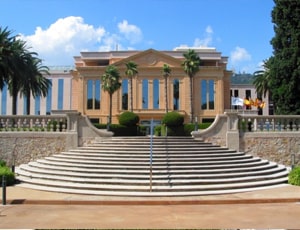
Apart from in-detail treatment procedures available, Centro Medico Teknon located in Barcelona, Spain has a wide variety of facilities available for International Patients. Some of the facilities which are provided by them are Accommodation, Airport Transfer, Choice of Meals, Interpreter, SIM, TV inside room. Also listed below are some of the most prominent infrastructural details:
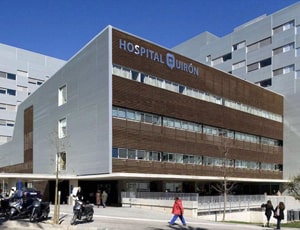
Apart from in-detail treatment procedures available, Hospital Quirnsalud Barcelona located in Barcelona, Spain has a wide variety of facilities available for International Patients. Some of the facilities which are provided by them are Accommodation, Airport Transfer, Choice of Meals, Interpreter, SIM, TV inside room. Also listed below are some of the most prominent infrastructural details:
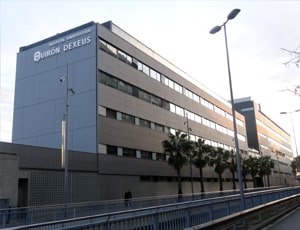
Apart from in-detail treatment procedures available, Dexeus University Hospital located in Barcelona, Spain has a wide variety of facilities available for International Patients. Some of the facilities which are provided by them are Accommodation, Airport Transfer, Choice of Meals, Interpreter, SIM, TV inside room. Also listed below are some of the most prominent infrastructural details:

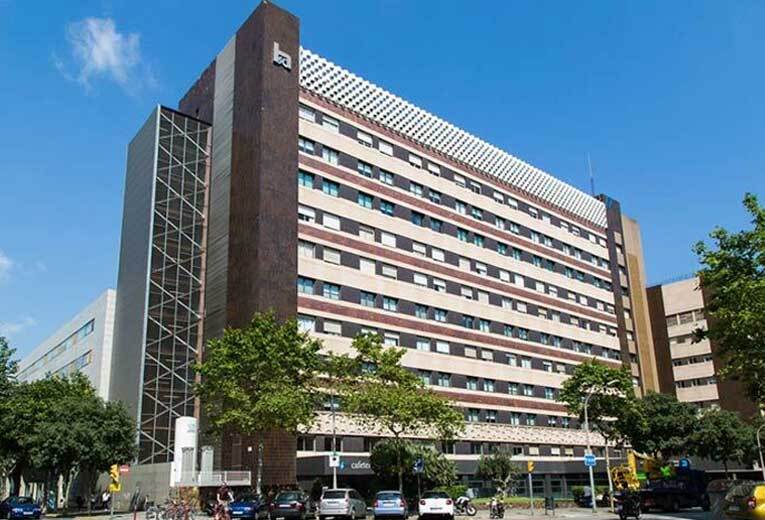
The Hospital is an amalgamation of a group of buildings located in the Eixample Left of Barcelona, ??between Paris, Viladomat, and London streets. It has a capacity of 350 adjustable beds and first-class hotel-like services inpatient rooms. Currently, it has a workforce of about 1100 Healthcare Professionals.
In order to treat patients with intensive care, the Hospital has 10 beds in its ICU for critically ill patients.
The Hospital has launched a few more things to improve customers’ services- 4 new Operating Rooms and a New Diagnostic Imaging Service.
Other Services
Types of Room
Double Rooms, Double Rooms for Individual Use, and Single Rooms; equipped with an easy-to-use electrical movement control system and a nursing call/warning system, located at the head of the bed, a sofa-bed for the companion, and a bathroom with a shower. They are also equipped with television and telephone.
A cafeteria/Restaurant is also available for the patients or visitors.
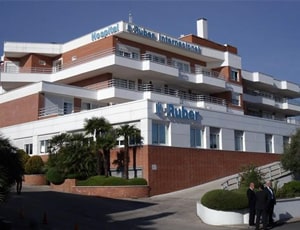
The Hospital has a wide architectural structure that consists of-
With about 80,000 m 2 , it is equipped with the highest sanitary technology and offers a wide portfolio of services-
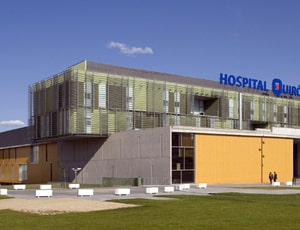
Apart from in-detail treatment procedures available, University Hospital Quironsalud Madrid located in Madrid, Spain has a wide variety of facilities available for International Patients. Some of the facilities which are provided by them are Accommodation, Airport Transfer, Choice of Meals, Interpreter, SIM, TV inside room. Also listed below are some of the most prominent infrastructural details:
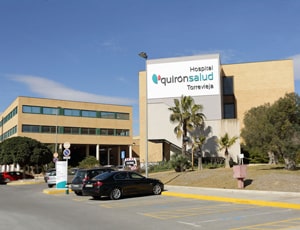
Quironsalud Torrevieja Hospital located in Torrevieja (Alicante), Spain is accredited by ISO. Also listed below are some of the most prominent infrastructural details:
Coronary artery bypass grafting (CABG) is a type of an open heart surgery that intends to improve the flow of blood to the heart. It involves the placement of a coronary artery bypass graft, which is retrieved from a healthy artery in the body, and placed in the position of the blocked portion of the artery that supplies blood to the heart. CABG surgery is a complex, yet common procedure.
A waxy substance called plaque may deposit in good amount in the coronary arteries of the heart over a period of time. As time advances, the plaque starts hardening and eventually ruptures and breaks open. The plaque interferes with blood flow as arteries grow narrow at the affected region. A blood clot develops when the plaque ruptures. The artery may get blocked completely is the size of the clot is big enough to stop the flow of blood to the heart. This may eventually lead to serious events such as heart attack and also put the individual at the risk of death.
The person may experience chest pain and discomfort when the heart is deprived of rich oxygenated blood This pain is referred to as angina. Breathlessness and fatigue are some of the other problems associated with coronary heart disease.
Coronary artery bypass surgery aims at improving the overall blood circulation to the heart. A part of healthy artery or vein from another part of the body is taken and is grafted or connected to the blocked coronary artery for bypass. This artery or vein goes around the blocked portion of the coronary artery and establishes a new path for the blood to flow to the heart, thus reducing the chance of a heart attack. In a single surgery, surgeons can bypass multiple coronary arteries. Severe blockages can be treated with this procedure.
CABG is conducted when there are one or two blockages in the artery. High risk CABG is conducted when there are multiple blockages in the artery and the blood flow to the heart is severely restricted.
There are two approaches to conduct CABG – open heart surgery and laparoscopic bypass heart surgery. The latter is a type of minimally invasive heart bypass surgery, which involves the creation of smaller incisions. This results in minimum discomfort and complications and allows for faster recovery and healing.
Laparoscopic bypass heart surgery is mostly preferred when there is not much blockage in the coronary artery. Open heart surgery, on the other hand, is conducted in complicated cases. High-risk CABG is mostly conducted as an open heart surgical procedure.
Patients are transferred to the ICU right after the surgery and shifted to the patient ward a day later. Heart rhythm disturbances are discovered in 25 percent of the patients within a period of 3 or 4 days after the surgery. They are temporary atrial fibrillations associated with surgical trauma. Such patients respond well to standard medical therapies.
They can be weaned within a period of a month after the surgery. From one week to one day, the range of stay in the hospital may vary from one patient to the other. Young patients are usually discharged within two days. The recovery time can be very long and the range of physical activities must be kept to a minimum.
Ask your healthcare adviser for the best multiple options and choose the one that meets your expectations
In Barcelona, the average starting cost for Coronary Artery Bypass Grafting (CABG) is $27000. Many multispeciality hospitals which are JCI certified are approved to operate a Coronary Artery Bypass Grafting (CABG) in Barcelona.
Different hospitals have different pricing policy when it comes to the cost of Coronary Artery Bypass Grafting (CABG) in Barcelona. The top hospitals for Coronary Artery Bypass Grafting (CABG) in Barcelona covers all the expenses related to the pre-surgery investigations of the candidate. The Coronary Artery Bypass Grafting (CABG) package in Barcelona includes the fees of the surgeon, hospitalization and anesthesia as well. There are many things that may increase the cost of Coronary Artery Bypass Grafting (CABG) in Barcelona, including prolonged hospital stay and complications after the procedure.
There are several best hospitals for Coronary Artery Bypass Grafting (CABG) in Barcelona. The following are some of the most renowned hospitals for Coronary Artery Bypass Grafting (CABG) in Barcelona:
The recovery of the patient many vary, depending on several factors. However, on an average, patient is supposed to stay for about 16 days in the country after discharge. This period is important to conduct all the follow-up tests to ensure that the surgery was successful and the patient can go back to the home country.
Barcelona is considered to be one of the best places for Coronary Artery Bypass Grafting (CABG) in the world. This is because of the availability of some of the best doctors, advanced medical technology and good hospital infrastructure. However, some of the other popular destinations for Coronary Artery Bypass Grafting (CABG) include the following:
There are certain expenses additional to the Coronary Artery Bypass Grafting (CABG) cost that the patient may have to pay for. These charges may vary from 45 USD per person.
After the Coronary Artery Bypass Grafting (CABG) surgery takes place, the average duration of stay at the hospital is about 5 Days. During the recovery, the patient is carefully monitored and control tests are performed to see that everything is okay. If required, physiotherapy sessions are also planned during recovery in hospital.
There are about 4 Hospitals Coronary Artery Bypass Grafting (CABG) hospitals in Barcelona that are best known for their services. These hospitals have the required infrastructure and a decided Coronary Artery Bypass Grafting (CABG) unit where renal failure patients can be treated. Such hospitals follow all legal protocols and guidelines as specified by the local medical affairs body when it comes to the treatment of international patients.
Some of the most sought after doctors for Coronary Artery Bypass Grafting (CABG) in Barcelona are: